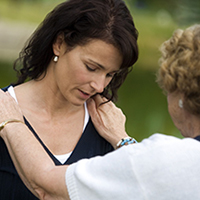
Contributor: W. Travis Stewart, LPC, NCC writer for Addiction Hope
Step 8 of the 12 Steps: Made a list of all persons we had harmed, and became willing to make amends to them all.
Christianity is one of the few institutions in the world that has, as a basic tenet of faith, the requirement that members admit they are selfish. This is part of what makes it so unpopular and out of favor with the politically correct culture in the West today. This is also one of the things it has in common with Alcoholics Anonymous.
Damn selfish
Richard Rohr (whom I have been referring to a great deal in my writings on the 12 Steps) says in his book, Breathing Underwater; Spirituality and the Twelve Steps, “A.A is the only group I know that is willing and honest enough to just tell people up front, ‘You are damn selfish!’ “
 This is counter-cultural to the self-love most of us under the age of 60 have grown up with. We have been told that the love of self is the “greatest love of all” by Whitney Houston, that we can be “anything we want to be” by many of our teachers and parents and that improving our self-esteem is the solution to most of society’s ills.
This is counter-cultural to the self-love most of us under the age of 60 have grown up with. We have been told that the love of self is the “greatest love of all” by Whitney Houston, that we can be “anything we want to be” by many of our teachers and parents and that improving our self-esteem is the solution to most of society’s ills.
Unfortunately, lost in the avalanche of self-love, is the ability to see ourselves honestly and critically.
We have become so thin-skinned that we cannot receive constructive criticism without feeling crushed by disappointment and overcome with self-righteous anger.
If we are to make a list of “all persons we had harmed” and then make amends to them, we must gain a new attitude about ourselves and recognize that not only are we capable of harming others, but that we have done so motivated out of our own self-protection.
See yourself honestly
This is a difficult task. Seeing yourself honestly is not for the faint of heart. It requires at least three unnatural behaviors:
First is a willingness to listen. If you are going to make a list of ways you have harmed others you will need to ask at least some of those individually personally, “How have I harmed you?” Then you will need to sit and listen to them, without interrupting and without slipping into rationalization or a zombie-like numbness.
 Next is a curiosity without defensiveness. If you really want to learn and understand yourself and how you have harmed others—which is the heart of Step 8—you will need to ask some follow-up questions.
Next is a curiosity without defensiveness. If you really want to learn and understand yourself and how you have harmed others—which is the heart of Step 8—you will need to ask some follow-up questions.
You will need to be curious about the nature of the hurt caused. You will need to say things like, “tell me more” and “what do you mean when you said I was rude.”
Finally, you will need to develop a resistance to self-hatred. Hearing how you have harmed others will no-doubt be a difficult and painful task.
If you listen well and acknowledge the damage you have done, you may be tempted to slide into a swamp of self-pity and resort to self-hatred to once again protect yourself.
Resist it. Self-hatred is the beginning of another cycle of addiction.
Be courageous. Despite our instinct to avoid criticism, honestly facing the consequences of our behaviors will lead to a greater sense of freedom and hope than denial and avoidance ever will.
Community Discussion – Share your thoughts here!
How did facing the consequences of your behavior impact your recovery?
 About the author: Travis Stewart earned a Master of Arts in Counseling (2001) and a Master of Arts in Theological Studies (2003), both from Covenant Seminary in St. Louis, MO. Travis is a Licensed Professional Counselor in the State of Missouri and a writer for Eating Disorder Hope and Addiction Hope.
About the author: Travis Stewart earned a Master of Arts in Counseling (2001) and a Master of Arts in Theological Studies (2003), both from Covenant Seminary in St. Louis, MO. Travis is a Licensed Professional Counselor in the State of Missouri and a writer for Eating Disorder Hope and Addiction Hope.
The opinions and views of our guest contributors are shared to provide a broad perspective of addictions. These are not necessarily the views of Addiction Hope, but an effort to offer discussion of various issues by different concerned individuals.
We at Addiction Hope understand that addictions result from a combination of environmental and genetic factors. If you or a loved one are suffering from an addiction, please know that there is hope for you, and seek immediate professional help.
Last Updated & Reviewed By: Jacquelyn Ekern, MS, LPC on December 15, 2015
Published on AddictionHope.com
